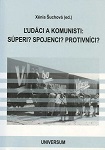Tzv. „slovenský buržoázny nacionalizmus“ v politike KSČ po XX. zjazde KSSZ (1956 -1960)
The “Slovak Bourgeois Nationalism” and the Policy of the Communist Party of Czechoslovakia after the 20th Congress of the CPSU (1956-1960)
Author(s): Mária Rusková
Subject(s): Recent History (1900 till today), Nationalism Studies, Post-War period (1950 - 1989), History of Communism
Published by: Historický ústav SAV
Keywords: Communist Party of Czechoslovakia; 20th Congress of the CPSU (1956-1960); Slovak Bourgeois Nationalism;
Summary/Abstract: The aim of this study is to show methods used by the Communist Party of Czechoslovakia (CPC) after 1956 to keep the vision of threat from the “Slovak Bourgeois Nationalism”. The reasons why the CPC did not intend to rehabilitate the people accused of “Slovak Bourgeois Nationalism” were ideological, political, and personal (the desire to hold power). The ideological and political reasons may be explained by the fear that to renounce the “Slovak Bourgeois Nationalism” means to completely renounce the “Slovak Nationalism”. It should be pointed out that the “Bourgeois Nationalism” was an important tool for the Communists in conducting their power policy. The feeling of insecurity concerning the maintenance of power beset the CPS in 1956 in relation with the situation in Hungary and Poland. The personal reasons were dominated by the fear of losing positions, which concerned mainly Novotný, Široký, Bacílek and others. The official causes of the existence of and direct pressure on the “Bourgeois Nationalists” were removed after 1956. However, the situation changed only little because the official Communist propaganda on the threat from the “Slovak Bourgeois Nationalism” survived in Czechoslovakia till the end of the 1960s.
Book: L'udáci a komunisti: Súperi? Spojenci? Protivníci?
- Page Range: 181-192
- Page Count: 12
- Publication Year: 2006
- Language: Slovak
- Content File-PDF

